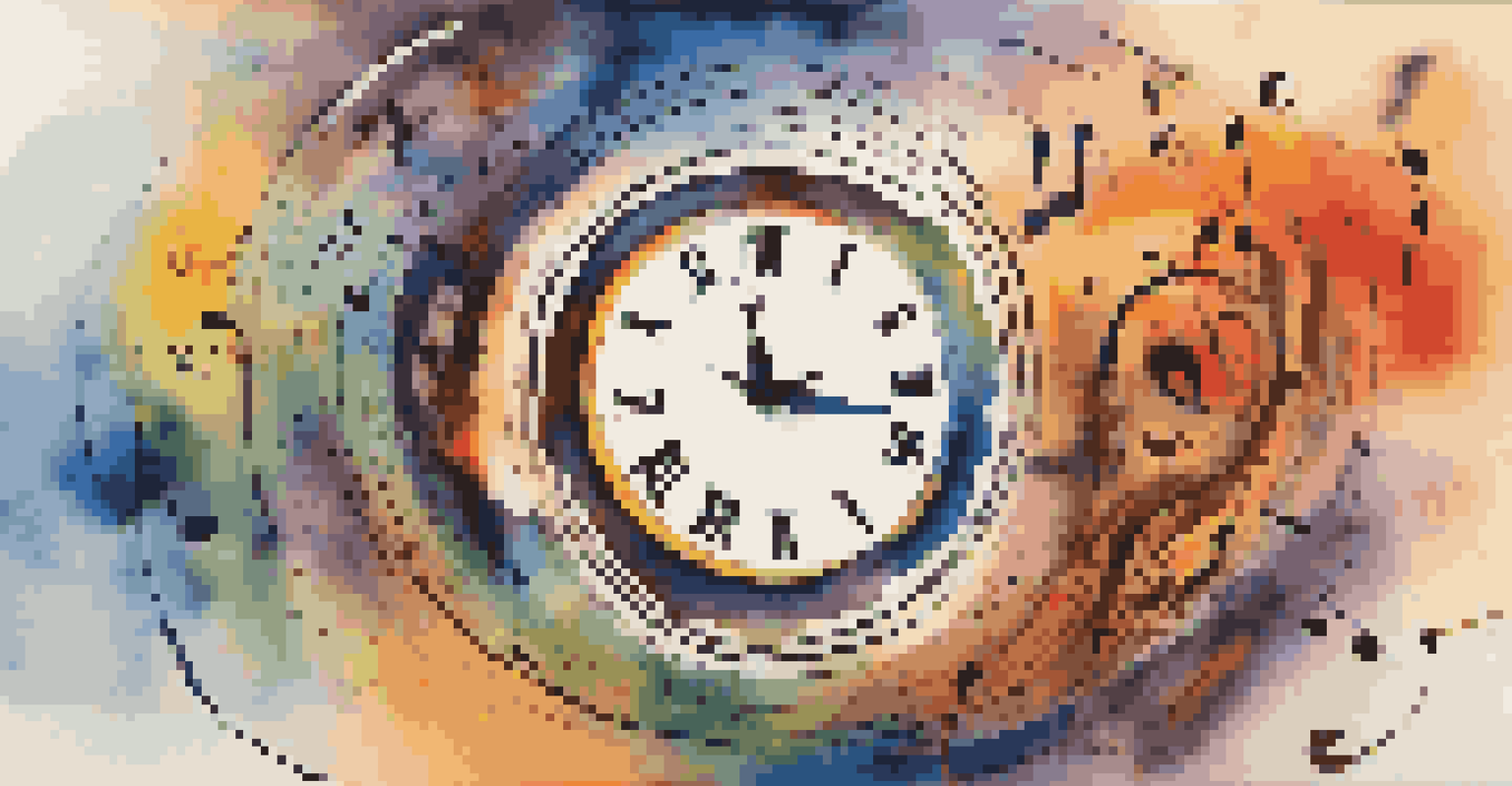The Use of Music in Cognitive Psychology and Time Perception

Understanding Cognitive Psychology and Its Importance
Cognitive psychology focuses on understanding how people think, learn, and remember. It's like peering into the mind to see how we process information and make decisions. By studying cognitive processes, psychologists can uncover how our brains work and use this knowledge in various fields, from education to therapy.
Music can change the world because it can change people.
One key aspect of cognitive psychology is how external stimuli, such as music, can impact our mental processes. Imagine trying to concentrate on a task while a catchy tune plays in the background; this can either enhance or detract from your focus. Music serves as a powerful tool that can manipulate our cognitive states and emotional responses.
Understanding the interplay between music and cognition helps us appreciate the nuances of human behavior. Whether it's improving memory recall or enhancing creativity, the influence of music in cognitive psychology opens doors to new methods of learning and therapy, making it a fascinating area of study.
The Basics of Time Perception in Psychology
Time perception refers to how we experience the passage of time, which can vary significantly based on different factors. Think of a thrilling movie where time seems to fly, versus a boring lecture where every minute feels like an hour. This subjective experience of time is crucial in understanding human behavior and decision-making.

Psychologists study time perception to uncover how our brains process temporal information. Factors such as attention, emotion, and even music can skew our perception of time. For example, when we’re engaged with a favorite song, we might lose track of time altogether, highlighting the connection between our mental state and how we perceive time.
Music Enhances Cognitive Performance
Listening to music can significantly improve focus, memory recall, and emotional regulation, making it a valuable tool in both learning and therapeutic settings.
The exploration of time perception reveals insights into our daily lives and influences decisions. By understanding how we perceive time, psychologists can help individuals manage their time better in various settings, from work environments to personal relationships.
How Music Affects Cognitive Processes
Music has a profound impact on cognitive processes, influencing everything from attention to memory. Studies have shown that listening to certain types of music can enhance focus and improve performance on tasks. For instance, classical music is often associated with increased concentration and productivity, making it a favorite for studying.
The mind is everything. What you think you become.
Moreover, music can trigger emotional responses that alter cognitive functioning. When we listen to uplifting tracks, our mood improves, which can, in turn, boost our cognitive abilities like problem-solving and creativity. It’s like giving your brain a little nudge to perform at its best.
This relationship between music and cognition highlights the potential for using music in therapeutic settings. Music therapy, for example, leverages these cognitive benefits to help individuals with various psychological conditions, making it an essential tool in mental health care.
The Role of Rhythm in Time Perception
Rhythm plays a critical role in how we perceive time, acting as a natural metronome for our brains. When we listen to music with a steady beat, it creates a sense of temporal structure, making time feel more predictable. This rhythmic pattern can help us gauge the passage of time more accurately.
Interestingly, our brains are wired to respond to rhythmic stimuli, which can enhance our timing abilities. For instance, musicians often develop a heightened sense of timing through practice, allowing them to predict and navigate musical passages with ease. This skill can extend beyond music, influencing how we perceive time in other contexts.
Time Perception Influenced by Emotion
Our emotional state, shaped by the music we listen to, can alter our perception of time, with upbeat songs making time feel faster and sad tunes slowing it down.
Incorporating rhythm into daily activities, like exercising to a beat or using a metronome while practicing a skill, can improve our time perception. This connection between rhythm and time highlights how music can serve as a powerful tool in enhancing our temporal awareness.
The Impact of Genre on Cognitive Function
Different music genres can evoke distinct cognitive responses, affecting how we think and feel. For instance, upbeat pop music might energize us during a workout, while ambient music may promote relaxation and focus during study sessions. The genre of music influences our emotional state and, consequently, our cognitive performance.
Research indicates that familiar music can enhance memory recall, as our brains create associations between tunes and memories. For example, hearing a childhood favorite song can transport us back in time, triggering vivid recollections. This phenomenon underscores the powerful link between music and memory.
Understanding how various genres affect cognition can help us tailor our environments for optimal performance. Whether it’s selecting the right playlist for studying or choosing calming sounds for meditation, being mindful of music’s impact can significantly enhance our cognitive experiences.
Music and Emotional States in Time Perception
Our emotional state plays a pivotal role in how we perceive time, and music can significantly influence our emotions. When we listen to a sad song, time might feel like it's dragging, while an upbeat tune can make it fly by. This emotional connection to music shapes our experience of time in profound ways.
Research has shown that positive emotions can lead to a sense of time speeding up, while negative emotions may cause it to feel prolonged. This interplay suggests that music can be a useful tool in managing our emotional states and, by extension, our perception of time. For instance, creating a playlist of uplifting songs can help lift our mood and change our experience of time during a tough day.
Rhythm Affects Time Awareness
Rhythm serves as a natural metronome for our brains, enhancing our ability to perceive time accurately and influencing how we engage in various activities.
By harnessing the power of music to evoke specific emotions, we can influence our time perception and enhance our daily experiences. Whether it's through relaxation techniques or motivational playlists, music serves as a bridge to better emotional and cognitive well-being.
Applications of Music in Therapy and Education
The intersection of music, cognitive psychology, and time perception has led to innovative applications in therapy and education. Music therapy is being utilized to aid individuals with cognitive impairments, helping them improve memory and emotional regulation. By engaging with music, patients can access parts of their memory that may have been otherwise unreachable.
In educational settings, incorporating music into learning activities can enhance students' cognitive abilities. For example, using songs to teach complex subjects can help students remember information more effectively. The rhythmic and melodic elements of music make learning more engaging and enjoyable, facilitating better retention.

These applications demonstrate how understanding the relationship between music and cognitive psychology can lead to meaningful interventions. As researchers continue to explore this connection, the potential for music to enhance our cognitive experiences in both therapy and education remains a compelling area of study.